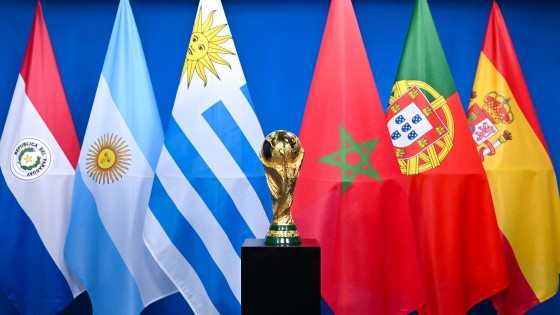FIFA World Cup 2030 Schedule, Venue, Format, Host Countries And Broadcast Details In 2030, the FIFA World Cup will redefine the term “global spectacle” as it ventures into uncharted territory. With a remarkable plan to span six countries, five time zones, three continents, and two different seasons, this World Cup promises to be an unparalleled experience for fans and players alike. Here’s a closer look at this ambitious endeavor.
Who Will Host FIFA World Cup 2030?
For the first time in World Cup history, the tournament will span across continents as co-hosts join forces. Spain, Portugal, and Morocco will join forces with Uruguay, Argentina, and Paraguay to create a massive football event. To commemorate the centennial of the first World Cup, Uruguay, Argentina, and Paraguay will host the inaugural matches. After that, the tournament will move on to North Africa and Europe.
When Will The FIFA World Cup 2030 Start?
FIFA will launch the 48-team tournament in Uruguay, Argentina, and Paraguay as part of their “Centenary Celebration Matches” in June-July 2030. Later, the event will transition to the primary host nations, Spain, Portugal, and Morocco.
FIFA World Cup 2023 A 48-Team Tournament
Expanding the World Cup to host 48 teams is a significant change for the 2030 event. The tournament will take place in 16 host cities, increasing excitement and engagement. With 104 matches and a new last-32 stage, this World Cup aims to be larger and more inclusive than ever before.
Also Read: FIFA World Cup 2026: Hosts, Qualifiers Date And Teams Qualified So Far
Navigating the Hemisphere Shifts
One unique aspect of this multi-continental World Cup is the transition between hemispheres. This allows teams to play in two different seasons. Teams that start their matches in South America will experience a quick change from winter to summer as they continue their journey in Europe or North Africa. This shift in climate and season presents interesting challenges for teams and adds an intriguing element to the tournament.
Challenges in Travel, Scheduling, and Sustainability
This hosting plan raises concerns about travel logistics, scheduling, and environmental impact. The movement between continents and countries requires a lot of travel, affecting both the teams and the fans who want to follow their nations. Addressing sustainability concerns in such a big tournament is a big challenge. FIFA acknowledges this and is committed to implementing a strong sustainability strategy to minimize the event’s environmental impact.
Also Read: FIFA World Cup 2026 Qualifiers Draw – India’s, Fixtures, Schedule, And Group
Can The Plans Of FIFA 2030 Be Truly Be Sustainable?
The 2030 World Cup is a remarkable endeavor that holds great potential for international collaboration and celebration. However, FIFA’s past environmental claims have left the world rightfully cautious. As plans for the multi-continent tournament evolve, the global community will closely watch to ensure that FIFA lives up to its promises of sustainability. Balancing the grandeur of a multi-continental event with environmental responsibility is a challenge that FIFA must face head-on to ensure a World Cup that truly leaves a positive impact on both the game and the planet.
Lessons from the Past: False Statements and Future Implications
The history of FIFA’s environmental pledges raises valid concerns regarding the sustainability of the upcoming 2030 World Cup. The failure to substantiate claims for the 2022 World Cup’s carbon neutrality raises questions about whether FIFA can deliver on its promises for the 2030 edition. Freddie Daley, a researcher at the University of Sussex, emphasizes the environmental impact associated with a tournament of this magnitude, especially concerning air travel for athletes and fans. These concerns underscore the importance of carefully scrutinizing FIFA’s plans and actions to ensure a sustainable and climate-friendly approach.
Bridging the Gap: Mitigating the Environmental Impact
FIFA has acknowledged the need to address the environmental impact of hosting such a vast and far-reaching tournament. Their commitment to taking all necessary measures to mitigate this impact is a step in the right direction. However, it is crucial for FIFA to transparently outline these measures and provide a clear roadmap for achieving their sustainability goals. Effective strategies, such as investing in renewable energy, offsetting carbon emissions, and implementing eco-friendly infrastructure, will be instrumental in minimizing the environmental footprint of the 2030 World Cup.
Also Read: Will Messi And Ronaldo Play In FIFA World Cup 2026?
Six Nations, One Passion: 2030 World Cup Fan Experience
With the World Cup being hosted by six nations, fans will see a unique mix of cultures and football excitement. Each co-hosting country will bring its own perspective to the World Cup, making the tournament even more interesting. However, organizing such a large event in multiple locations presents challenges for traveling fans, so careful planning and coordination are necessary.
In conclusion, the proposed hosting plan for the 2030 World Cup is an ambitious step into a new era of global football. With its wide geographical coverage, expanded tournament format, and changing climates, this World Cup will surely capture the world’s attention like never before. The success of this bold endeavor will undoubtedly set a precedent for future multi-nation hosting and promote inclusivity and unity in football.
FIFA 2030 Broadcast Details
Yet To be released.
Other FIFA Updates
FIFA 2034 Hosting Updates
The Saudi Arabian Football Federation (SAFF) confirmed its intention to bid for hosting the 2034 men’s World Cup. SAFF expressed its aim to deliver a world-class tournament for the 25th edition, drawing inspiration from the country’s deep-rooted passion for football. Despite the AFC’s support for Saudi Arabia, Football Australia chief James Johnson stated that they are still exploring a bid to host the 2034 World Cup.
FIFA 3038 Hosting Updates
Ghana, aligning with its long-term development plan, expresses its ambition to host the 2038 World Cup, reflecting the country’s determination to showcase its capabilities on the global sporting stage.









